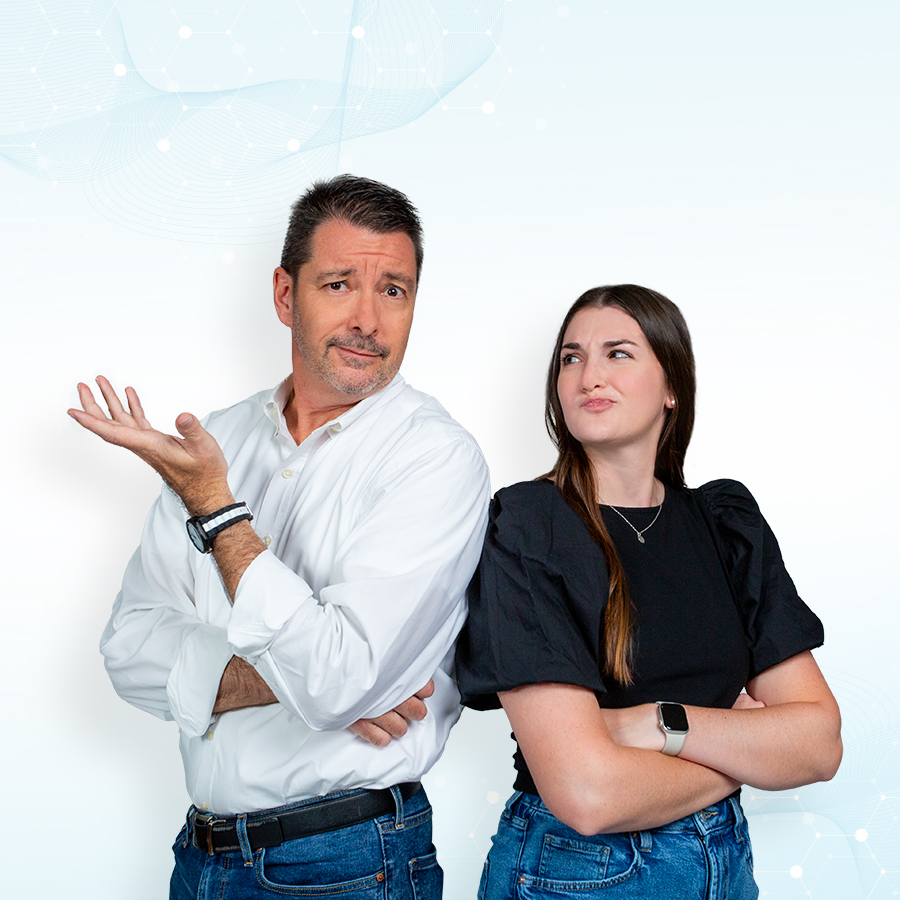The Dad and Daughter Debate: How much medical information should you share with family?
How much medical information should you share with family?
MARC ROBERTZ-SCHWARTZ
I grew up in a household – and probably a generation – where there were a handful of topics we did not talk about at the dinner table.
For the most part, anything having to do with money and medical were generally off limits.
Ironic, since my dad was a career pharmacist.
I had no idea what kind of medical ailments or conditions either of my parents had.
Every now and then as a kid, I might pick up on something – some test my dad had to take, and the vague recollection of a doctor telling him he was “a ticking time bomb.” (He’s still alive and ticking today, in a good way). And I do remember being about 7 years old, my grandparents speaking in Yiddish about the hospitalization of another family member. Obviously, I had no idea what they were saying, but that was their goal. There’s a line in the 1940s-period Neil Simon comedy, “Brighton Beach Memoirs,” where the main character points out that you don’t say the word “cancer” out loud, you can only whisper it.
As I got older, I often wondered why some of these topics were so taboo. Maybe it was generational for my parents as well. Or, perhaps they were protecting me out of genuine concern for my ability to process information that could be considered frightening, overwhelming or embarrassing.
My daughter’s formative years (beginning around age 8) were when I was producing a local medical program, “Hometown Health TV.” It was not uncommon for her to hear about my day, the conditions I learned about, the doctors I interviewed and the specialties and procedures I had no idea existed. This was a small part of my conscious plan, shared by my wife, to be as open and honest as we could be with our daughter when it came to health, wellness and medical situations.
One of the common themes I would hear while interviewing patients was their lack of knowledge about their family medical history, and had they known (fill in the condition) ran in the family, they would have been more proactive about their own care.
So my daughter knows high cholesterol is a genetic trait on my side of the family, and that diabetes runs on her mother’s side. She knew full well about my hernia surgeries as well as our colonoscopies when my wife and I turned 50. She knows mom goes for an annual mammogram and gynecological exam, so that these preventative steps are not taboo for her.
We’ve become a family that has made talking about medical conditions very easy and comfortable. It began with her being comfortable at the pediatrician and continues today.
At the same time, my wife and I are also aware that there will be some things our daughter is more comfortable talking about with mom than dad. And dad’s ok with that… as long as she’s comfortable talking.
CADI SCHWARTZ
I’m not going to lie to you, I struggled with this debate a little. I don’t think there is one right or wrong answer to this question, but I’m going to tell you what I know and what I have learned over the past 22 years.
I was 7 when my grandfather passed away from cancer, my first major loss. Despite being so young, I knew he was sick. I knew he had cancer. I knew what kind of cancer and I generally knew the progression. I attribute a lot of this to listening and asking questions. That’s one thing about me. I ask a lot of questions. Some call it nosiness. I consider it being invested in and caring about those around me.
As I have gotten older and have experienced more, I have learned more about my family’s medical history. There wasn’t a specific age at which this happened. It comes with time, experience, and yes, questions.
I have always been very open with my parents when it comes to anything health-related. I like to think they are open with me as well (right, Dad?). My grandparents, not so much. In my family, there hasn’t been a lot of sharing. I don’t really know why that is. My guess is that it has something to do with wanting to protect the grandchildren and keep things positive. But withholding this kind of information can not only be upsetting, but also dangerous.
I understand that at my age some people don’t want to know or may not care about knowing their family’s health and medical information. It shouldn’t be a forced conversation that scares either party. I think it should be a consensual conversation with a goal of informing the child and the rest of the family about things they at one time or another will want to know. It will also help answer questions that could be useful for your own health and the health of your loved ones.
For my peers and those younger who are reading this, if you haven’t already, one day you will have to go to doctor’s appointments and fill out paperwork on your own. They are going to ask you questions about your family’s medical history and it’s important to know the answers.
It is also important to ask questions and to be prepared. If the information isn’t offered by your parents, politely take the initiative and prepare not only for yourself but your family. Maybe then the conversation won’t be as scary and uncomfortable as you might think.
Photos of Marc and Cadi by: Nicole Hamel

